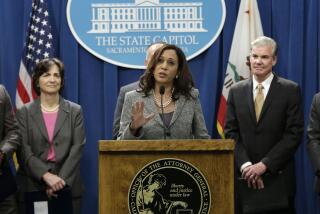Harris Prosecutor Says Informant Not Crucial : Justice: But at 1979 trial, deputy D.A. called convict’s now recanted testimony ‘important, profound.’
- Share via
Robert Harris’ first-degree murder conviction and death sentence in 1979 was “pretty much a given,” and the testimony of a jailhouse informant who has since recanted was not crucial to proving motive, state appellate court Justice Richard Huffman testified Thursday.
Huffman, a former chief deputy San Diego County district attorney, prosecuted Harris, whom he described as “a defendant with few redeeming values.” The Harris murder case “was one of the strongest homicide cases I’d ever seen,” Huffman added during testimony at a special hearing in U.S. District Court.
Harris’ attorneys have argued that the district attorney’s office succeeded in obtaining the death penalty for Harris in part by using information supplied by Joey Dee Abshire, the informant who said he acted at the behest of district attorney investigators and pumped Harris for information.
Although Huffman downplayed the importance of Abshire’s testimony, a transcript of his closing statement in Harris’ 1979 trial showed that he called it “an important, profound statement.” Harris’ attorney Gary Sowards read portions of Huffman’s statement:
“It is an important, profound statement for you to keep in mind; the statement from Robert Harris to Joey Abshire,” Huffman told the jury that decided Harris’ fate. “. . . The question is was it willful, premeditated and deliberate . . . Well, what did (Harris) tell Joey Abshire?”
When asked by Sowards if his closing statement suggested that he put a lot of importance to Abshire’s testimony, Huffman replied, “I certainly used the heck out of it at trial.”
Abshire, a 44-year-old career criminal, testified at the trial 12 years ago that Harris told him that he killed two 16-year-old boys, John Mayeski and Michael Baker, on July 5, 1978, to eliminate them as witnesses. Harris, and his brother, Daniel, kidnaped the boys and stole their car to use in a bank robbery.
Proving a motive was important for prosecutors. In order to obtain a death sentence, prosecutors had to prove that Harris planned the killings and did not act impulsively when he shot Mayeski and Baker.
Abshire testified at the federal hearing Tuesday and said that district attorney investigators John Boulden and Raymond Cameron enlisted him as an informant and had him question Harris about the murders while both men shared a holding cell in Chula Vista. Abshire said he agreed to cooperate with the investigators in exchange for favorable treatment.
In addition, Abshire said Boulden and Cameron coached him on how to testify and encouraged him to lie about the deal he reached with them. He said the investigators also provided him with newspaper stories about the killings to familiarize him with the case. Abshire recanted his 1979 testimony on Tuesday and said it was full of lies.
Harris’ attorneys said that Huffman and the prosecution team might not have been able to prove a motive to the jury without Abshire’s testimony. Abshire was the only witness who testified he had a direct conversation with Harris about the murders and the reason for the killings.
Huffman testified that he never asked Boulden and Cameron to recruit Abshire as an informant and said that his office did not enter into a deal with Abshire. He added that he never would have called Abshire as a witness if a deputy marshal had not overheard the conversation between Harris and Abshire while both inmates were sharing a cell.
Harris’ trial “was a horrendously strong death-penalty case,” Huffman said. He testified that prosecutors had plenty of evidence to prove a motive without Abshire’s testimony.
“The principle value of his testimony was to show Harris’ continued attitude toward the killing of the two young people. . . . He was bragging in his cell about the murder,” Huffman said.
Huffman was named a Superior Court judge by Gov. George Deukmejian, and was elevated to the 4th District Court of Appeal in 1988.
More to Read
Sign up for Essential California
The most important California stories and recommendations in your inbox every morning.
You may occasionally receive promotional content from the Los Angeles Times.










